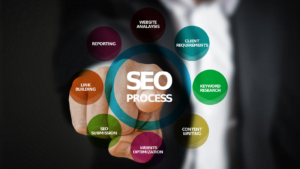SEO Guidelines for Successful Event Marketing

SEO and event marketing are two of the most important skills for any business. SEO is short for “search engine optimisation”, making your website as visible as possible to Google and other search engines. This means ensuring your website links back to relevant pages on your site, has good titles, descriptions and metatags, and uses keywords that people might search for when looking for information about your business or product.
Event marketing is a strategy businesses use to attract new customers through events. Events can range from small meetups with friends to large-scale rallies or festivals. By hosting an event, you create something people want (a chance to meet other like-minded individuals) and offer it at a discount or free of charge.
How does SEO work?
Search engine optimisation (SEO) is the practice of improving the ranking of a website on search engines. It is one component of online marketing. SEO can be used to improve the visibility and relevance of a website in search engine results pages (SERPs) or to drive more traffic to a site from search engines.
3 SEO Tricks for Marketing Events

Here are three tricks for marketing events:
- Plan ahead. Start planning your event months so you have time to plan the perfect promotional strategy. Make sure to create a strong social media presence, create attractive event branding, and coordinate with local businesses to get in on the action.
- Use technology tools to your advantage. Use technology tools like social media outreach tools, email marketing platforms, and website analytics software to track your progress and make tweaks.
Be creative. Don’t be afraid to experiment with different promotion strategies – sometimes, the best ideas come from the box! Keep an open mind when planning your event, and you’re sure to have a successful launch!
The Ultimate Guide to Effective SEO for Events
Effective SEO is essential if you’re running an event and want to ensure that people know about it. In this article, we’ll outline the basics of effective SEO for events and give you a step-by-step guide on how to get started.
- First, make sure that your website is optimised for search engines.
- Next, create an effective event listing on websites like Eventbrite and Facebook.
- Finally, use Social Media to promote your event and connect with potential attendees. By following these tips, you can ensure that your event gets noticed by potential attendees and online viewers alike!
Setting Up Your Event’s SEO: How to optimise your event’s SEO.

Event SEO is essential for any event, big or small. Optimising your event’s SEO can ensure that potential attendees find your event easily and that it ranks high in search engine results.
Here are some tips to help you get started:
- Choose a keyword that is relevant to your event.
- Register your domain name with Google and other major search engines.
- Create a custom title tag for your website that includes your chosen keyword.
- Upload high-quality images of your event and use keywords throughout the file names and alt text tags.
- Write concise content about your event and include links to secondary sources.
Create an Eventbrite account and add all the information needed to market your event online (including pricing, dates, location, etc.).
How to Create an Effective SEO Strategy for Your Event Marketing Efforts
There are many factors to consider when creating an effective SEO strategy for your event marketing efforts. Here are a few tips to get started:
- Choose a keyword that is relevant to your event.
- Test different keywords and see which ones are ranking highest on search engines.
- Make sure your website is optimised for search engine visibility.
- Develop relationships with key industry players, and collaborate with them on SEO campaigns for your events.
Use social media platforms to share information about your events and connect with potential attendees.
How to Boost Your Event Marketing Strategy with the Help of a Seo Guide
You can do several things to boost your event marketing strategy with the help of a seo guide.
- First, ensure your event website is well-designed and easy to use.
- Second, focus on building an online audience before your event takes place.
- Third, create promotional content that targets your target audience.
- Fourth, invest in SEO-optimized advertising campaigns that will reach your target audience. Finally, make sure to track and measure the success of your event marketing campaign to ensure continued growth.
Why is SEO important for event marketing?
- SEO is an essential part of effective event marketing. You can attract more visitors and boost online traffic by improving your website’s ranking on search engines. This boosts the chances of success for your event – both in terms of attendance and financial returns.
- You must also ensure that your website is optimised for search engine crawlers (bots). These are specialised algorithms that help index websites and allow people to find specific information quickly. If your site isn’t optimised for bots, people will only be able to see the first few pages before being redirected to a more relevant page.
The use of keywords throughout your content is crucial for boosting rankings. Not only do they help people find you when they’re looking for information on events, but they can also be used in ad copy and other marketing materials.
Conclusion
In conclusion, a well-executed search engine optimisation campaign for event marketing can help your business achieve its desired online presence and increase leads and sales. Make sure to consult with a qualified professional to get started on the right track, and keep in mind that consistent hard work and a bit of creativity will go a long way. ]
Remember, the goal is to get your business seen by as many potential customers as possible – so don’t be afraid to experiment and take some risks!
Was this article useful? Let us know in the comments.
FAQ
What is an event marketing strategy, and how can SEO help?
SEO for event marketing can help improve visibility for your events, helping to attract more attendees and generating leads from potential customers. Optimising your website and creating compelling content can create a foundation for increased traffic and better conversion rates.
With SEO in place, you can reach new audience members who might not have found out about your events. Additionally, effective SEO can help boost brand awareness and drive traffic to your online presence from search engine results pages (SERPs). With a well-executed SEO campaign, you can increase your event’s bottom line while also expanding your brand’s reach.
What are your top strategies for seo for events?
Here are some tips for optimising your event seo strategy:
- Choose a good domain name. Your event’s website should have a strong brand and memorable name that’s easy to search for and remember. Avoid generic or long names, as these will likely be harder to rank for in search engines.
- Make sure your website is optimised for SEO. This includes using keyword-rich titles, descriptions, and images; installing Google Analytics and its insights to track visitor engagement; and building links from authoritative sources (such as industry journals or other respected websites).
- Create engaging content. Share expert advice on topics such as planning an event, dealing with guests, or hosting an after-party.
What are the steps to creating a successful SEO campaign for an event?
Many steps must be taken to create a successful SEO campaign for an event.
- First and foremost, the event organisers must clearly understand the basics of SEO, including the different types of keywords that can be targeted, how to measure the success of their campaign, and what kind of content they should produce.
- Once they have a good understanding of how it works, they can start working on creating keyword lists and analysing competitor campaigns.
- They should also create initial content, ensure it is well-optimised for search engines, and add appropriately targeted images and videos.
- Finally, they should monitor their campaign regularly and make necessary changes.





